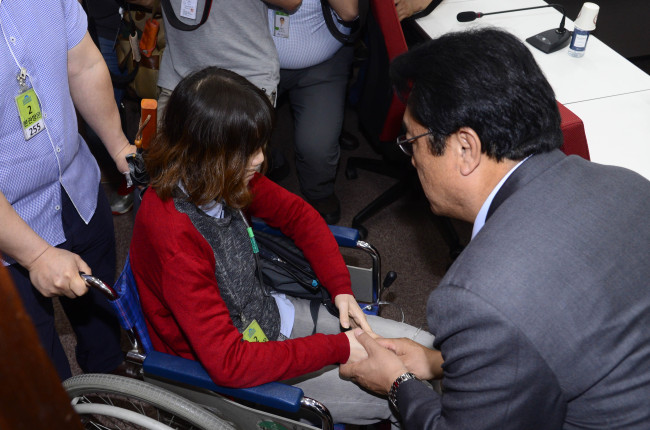Toxic humidifier sterilizer victims who used products distributed by local brand Aekyung -- manufactured by SK Chemicals -- have demanded that the firm be included in the ongoing prosecutorial probe.
The victims accused Aekyung of selling its products despite the health concerns.
According to tallies, a total of 27 died allegedly from using Aekyung’s products and 101 suffered damage to their health. However, up to this point none of them have received compensation from the company.
In 2011, the government said that the two suspect chemicals in Aekyung’s humidifier sterilizer -- CMIT and MIT -- did not directly cause lung damage, based on a Korea Centers for Disease Control and Prevention’s report in 2011. For this reason, their products were not banned from sale immediately, unlike other toxic humidifier sterilizers such as those from Oxy Reckitt Benckiser.
The company reportedly voluntarily withdrew its humidifier sterilizers from the market in August 2011. The prosecution also excluded Aekyung from its investigation earlier this year.
But the Asian Citizen’s Center for Environment and Health argued that a 6-year-old victim who recently underwent an operation to remove a tube in her neck had used the product, which was purchased after the decision to stop selling them.
“We are only responsible for the sales of the products (Humidifier Mate) which were manufactured by SK Chemical,” Aekyung’s public relations official told The Korea Herald.
“But we admit our ethical responsibility for those who suffered from the use of our product. We will do our best based on the result of the prosecution's investigation.”
When asked whether the company was admitting to the causality of their product with the deaths, he said the company was awaiting the results of the investigation and that there was no plan to compensate victims as of now.
On Tuesday, representatives of the victims’ group met with the ruling Saenuri Party’s whip Chung Jin-suk at the National Assembly.
 |
Saenuri Party floor leader Chung Jin-suk greets a humidifier sterilizer victim at the National Assembly on Tuesday. Park Hae-mook/The Korea Herald |
“I would like to say sorry to all victims' families. How can your sorrow in losing a family member be compared to anything?” said Chung, commencing the meeting.
“We are doing our best to find the root cause of the humidifier sterilizer tragedy,” he added.
Rep. Kim Gwang-lim, who participated in the meeting, told reporters that the party had reached an agreement with the victims’ group to hold a hearing by inviting responsible ministries, separate from the ongoing prosecutorial probe.
Holding a hearing was one of the demands proposed by the victims’ group. Its nine other demands include enacting a “Humidifier Sterilizer Special Law,” and removing the environment minister from his post.
On Tuesday, the Environment Ministry also vowed to investigate all biocide products until the end of next year for better safety standards on household products, amid widespread “chemical-phobia.”
A biocide is a substance formulated to destroy organisms harmful to humans and is often included in household products for antibiotics or sterilizing purposes. These products, however, can have negative effects if used in excessive doses.
“The ministry will firstly look into disputed household products such as deodorant or spray-type items that can pose higher health risk for users,” said the ministry in a statement.
The ministry also plans to ask some 8,000 manufacturers and import companies to submit lists of biocide substances contained in their products.
According to the Chemicals Registration and Assessment Act, just three out of 15 types of household products which come under direct supervision of the ministry are classified as biocide product -- antiseptics, repellents and preservatives.
The ministry added that the list of products that contain biocide will be assessed in terms of exposure and content level. The result of the assessment will be made available to the public to spread awareness.
Starting next year, the investigation will expand into biocide industrial goods, which did not fall under the 15 types of product under the ministry’s control.
By Kim Da-sol (
ddd@heraldcorp.com)








![[Today’s K-pop] Blackpink’s Jennie, Lisa invited to Coachella as solo acts](http://res.heraldm.com/phpwas/restmb_idxmake.php?idx=644&simg=/content/image/2024/11/21/20241121050099_0.jpg)